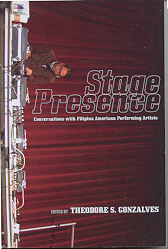
| jazz and blues news interviews and articles jazz gig guide | jazz and blues links audio files musicians ads |
| book review |
STAGE PRESENCE edited by Theodore S. Gonzalves :: Conversations with Filipino American Performing Artists by Ron Sagye La Rue 
STAGE PRESENCE Publisher:Meritage Press Pages:202 Paperback Stage Presence brings together in book form 10 artists: musicians, poets,dancers and choreographers of Filipino ancestry. Mostly known in the Filipino American community,but also in The Philippines. For the purpose of this review I'm focusing on artists influenced by Jazz. Gabe Baltazar Jr.(Filipino father,Japanese mother)a bonafide Jazz musician. Interviewed by Theo Garneau,speaks of his early up- bringing in Hawaii by mainly his grandmother. His father was a mus- ician working jobs-- Baltazar talks candidly about being Filipino/ Japanese(it wasn't that common in the 1930s,he played in Filipino bands firstly. Names like Benny Lapot a saxophonist, The Blue Chords, and Bernie Conception. Later on he went with Stan Kenton's band before that he recorded with drummer Paul Togawa. I wish the Garneau would have spent more time probing Baltazar's time with Togawa where they played how the audience accepted the group the album.(note Togawa told me years ago The Paul Togawa Quartet(Mode label;now VSOP)sold the best. More time is spent on his time with the Kenton band and how it was on the road. He also speaks to the issue of race relations, saying there wasn't any they accepted him. "We had a black singer Jean Turner and there was Curtis Counce(not 'Counts' as printed. Overall very good background information on Baltazar though again it would have been informative for Garneau to ask him about his albums under his own name,including the Los Angeles scene during the 1950s, '60s. Makata(poet) Jessica Hagedorn originally from The Philippines came to America in her teens best known for her novels Dogeaters, and Dream Jungle. Has worked with cutting-edge Jazz musicians trombone player Julian Priester(Sun Ra,Max Roach) composed music for her. Hagedorn shares her experience from the 1970s thru the 1980s,on the West Coast of America,San Francisco. And the transition to New York and being influenced by the Art Ensemble of Chicago Having gigs with vibist Jay Hoggard. Jazz musicians backing poets was 'in' during the 1950s and '60s. This is one of the shortest pieces in the book but very informative. Alleluia Panis durning the fall of 1983 she began choreographing for the San Francisco Kulingtag Ensemble, though she's worked with Fred Ho saxophonist she explains how music inspired her choreo- graphing from the early 1980s thru 1995, and at times the music drove the choreography in unexpected ways. What is interesting is that "Manong" her first dance was inspired by an American story,but almost no mention of it! A Song for Manong was performed in San Fra ncisco--the music was composed by Francis Ho, the following day of the last performance the music was recorded. Released on an album of the same name. Now available on "itunes". She does mention the names Robert Henry,Joey Maliga and Dana Nunez who were part of Kulingtang Arts also on the album. Panis converses on "Cycels" a CD released 3 years later. Pearl Ubungen another choreographer/cultural activist Jazz plays a central role in her work,has worked with saxophonist Roberto De Haven associated with St. John Coltrane Church(in his honor).She too has a interesting story to tell;check it out. Eleanor Academia considers herself a Rock musician but while she was at Columbia records the marketing department didn't know were to put her music. So, she was signed to the Jazz roster along with Miles Davis, Wynton Marsalis etc. Playing keyboards she was told she could be a female Herbie Hancock! Maybe even a Gloria Estefan, Having performed with Joe Zawinul and opened for Nancy Wilson. she states she was "blown away listening to Art Tatum"furthermore Academia is trained in Kulingtan by the master Danongan Kalanduyan who is also a subject in Stage Presence. There are excellent con- tributor biographies at the back of the book. More info at: www.meritagepress.com published 26.10.2010 © 2005 jazz news :: home page |